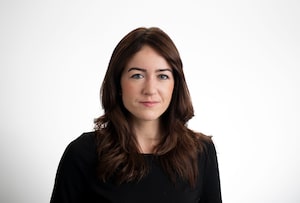Right wing Alternative for Germany (AfD) top candidate for the upcoming general election, Alice Weidel, speaks during a campaign in Berlin on Sept. 24.ANNEGRET HILSE/Reuters
The Alternative for Germany party that swept into parliament four years ago, becoming the first far-right party since the Second World War to win seats, is not expected to have the same success in Sunday’s election, with polls showing support at 11 per cent. But experts say the AfD is here to stay.
The party gained supporters in 2017 by espousing anti-immigrant rhetoric and demonizing Chancellor Angela Merkel for her decision to welcome more than a million refugees, mostly from war-torn Syria. But without that crisis looming large, immigration is no longer a huge issue in Germany, and the party has struggled ever since to find a topic that resonates with swing voters.
Oliviero Angeli, a political-science professor at the Technical University of Dresden, said the AfD has talked about COVID-19 measures during this campaign, but the issue typically divides far-right voters in Germany, with some supporting restrictions and lockdowns and others opposing such measures.
“That’s why the party’s campaign against corona has not been as successful as it was in 2017, when they were campaigning against Merkel’s migration policies,” he said.
The AfD has struggled to find an approach to the pandemic that would appeal to more than its base. In fact, the party has changed its position several times: When the pandemic hit, leading AfD politicians called for strict measures; but shortly afterward, they demanded an immediate end to the shutdown.
Uwe Jun, a political-science professor at Trier University, said the AfD simply could not find another issue to champion, because while migration is a concern for the party’s supporters, it is not for many other voters.
Still, the AfD tried to stoke fears about the prospect of Germany welcoming Afghan refugees. “Cologne, Kassel or Konstanz can’t cope with more Kabul,” reads one of the party’s posters. Ms. Merkel has said Germany will welcome 10,000 to 40,000 Afghans who assisted its government or military.
But other factors have contributed to the party’s inability to attract voters, Prof. Jun said, such as tensions between moderate and radical factions of the party and the fact that, when a new coalition government is formed, the other parties will not allow the AfD to be part of it.
Prof. Jun said it is unlikely the party will gain much more support in the near future. But he said it still has supporters in the east among voters with authoritarian values and people who feel economically disadvantaged.
“I can’t see any signs that they will go away from the AfD as their favourite party. So we have to live with the party and its strongholds in the eastern part of Germany,” he said.
In 2017, almost 13 per cent of voters chose the AfD. Political observers wondered if it would move toward the centre in parliament or try to undermine the democratic system from within.
It is fair to say that neither became a reality. The AfD has become more radical, not less. But it has failed to achieve its goal of becoming an indispensable part of a coalition government.
Polls see the AfD at 10-to-12-per-cent support, which would mean it could lose seats and its status as the largest opposition party in parliament.
Political scientist Marcel Lewandowsky of the University of Florida said the AfD is “currently trapped” with a stagnant base – partly because Ms. Merkel is retiring and this election campaign has focused more on her prospective successors than policy.
Other topics the party has tried to promote have not resonated with many voters. Its slogan, “Germany. But normal,” focuses on its nationalist policies. The AfD wants to leave the European Union, reinstall checkpoints at the border and restrict access to the labour market for foreign workers. “We share our pension. But not with the whole world,” one of its posters says.
And the party’s radicalization has also alienated possible voters. After the last election, AfD leader Frauke Petry left the party, criticizing its “national conservative” course, and was followed by members of parliament. And leading AfD politicians tried to exclude Bjoern Hoecke, a prominent AfD politician in Eastern Germany, from the party in 2017 after he demanded a “180-degree turn” in the country’s commemoration of its wartime past. He said no other country had put a “memorial of shame” in the heart of its capital, referring to the Holocaust memorial in Berlin.
The actions and remarks of some party members were considered so extreme that Germany’s domestic intelligence agency began looking at the AfD closely as early as January, 2019. In March, 2021, it wanted to place the party under surveillance, according to local media. This led to fierce internal fights about the direction the AfD should take.
In an interview, Tino Chrupalla, one of the party’s leaders, compared the intelligence agency to the Stasi, the repressive state security service of East Germany. His colleague Joerg Meuthen warned against the party becoming too radical – and was harshly criticized by party members.
The AfD will continue to shape debates and influence politics, political scientists say, even though other parties have refused to work with them.
Benjamin Hoehne, the deputy director of the Institute for Parliamentary Research in Berlin, said the AfD will likely fare worse in this election because it doesn’t have a winning issue, “but that doesn’t mean that the AfD became irrelevant for the political debate.” Parties react to the AfD, even if only to prevent voters from drifting away.
Our Morning Update and Evening Update newsletters are written by Globe editors, giving you a concise summary of the day’s most important headlines. Sign up today.
 Janice Dickson
Janice Dickson